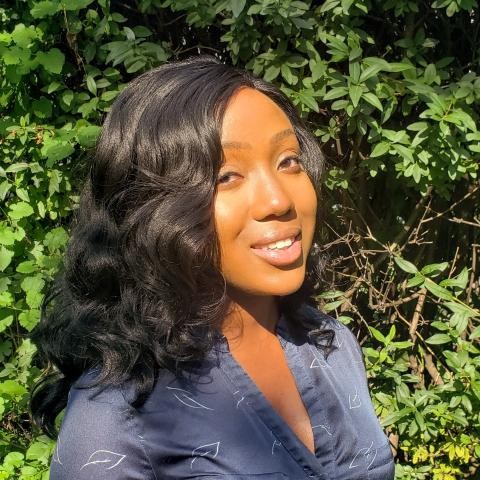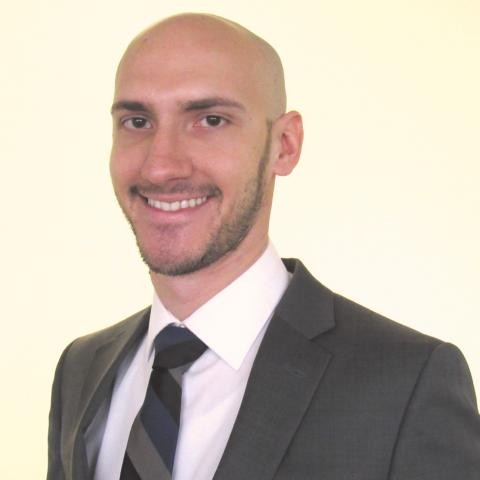The University of Chicago's Neuroscience Institute has served as the University's multidisciplinary home for neuroscience research since 2014. We organize a host of neuroscience courses and lecture series events for undergraduate and graduate-level trainees, and our staff's hard work shows in the consistent growth of our programs and neuroscience community. We asked each dedicated member of the team to share a bit about themselves and their experience working at the Neuroscience Institute.
Stephanie Dubbeld - Executive Administrator

What does a typical day look like for you, and what are you currently working on?
I keep my hands in a lot and stay involved in event organizing during our normal day-to-day. I meet with admins and plan out our general operations with them as a team. A large part of my job is the financial management of our Institute, Center and Undergraduate major. Oversight of the Undergraduate Major requires a detailed focus to ensure our students are properly supported through the development of the curriculum, BS programs and currently setting up for our summer internships. Another area that requires my focus is working with Brent Doiron to develop the new Center for Quantitative Biology and Human Behavior through postdoctoral training programs and faculty recruiting.
Our upcoming lab renovations for Marlene Cohen, a recent department recruit, is one of our projects that highlights the Institute's overall goals. Dr. Cohen is a talented neuroscientist focusing on circuit-level research with an interdisciplinary background that will elevate our community broadly. John and I also regularly discuss the impact of diversity and inclusion within our neuroscience community, how we are doing relative to our peers, and what we can do to improve.
What three words describe your feelings about your role?
Proud, Invested, Positive
Favorite travel destination?
Kenya had the biggest impact on me. I chose Africa to see the Serengeti and wanted to immerse myself in that experience. Elephants are my favorite animal, and an opportunity arose through the Detroit Zoological Society, so I jumped at the chance to go.
John Maunsell - Director

What does a typical day in the Neuroscience Institute look like for you as the Neuroscience Institute's Director?
One of the best parts of directing the Neuroscience Institute is that it involves such a large and broad range of constituents and programs. A lot of my effort involves meeting with neuroscience faculty, students, and staff from across the University to work on programs to enhance research and teaching related to neuroscience.
What three words would you use to describe your role?
Supporting, enabling, and busy.
What sparked your earliest initial interest in neuroscience?
I was focused on biology since middle school. At some point in college, I stopped to think about what the most important unanswered problems in biology were. It didn't take long to realize that neuroscience was where the most challenging and profound questions would lie. I don't think I was wrong.
Elena Rizzo - Director of Graduate Education, Neuroscience, and Medical Physics

What does a typical day look like for you, and what are you currently working on?
There are no "typical" days, but each often combines lots of email writing, a couple of meetings with faculty, students, and colleagues, and attending the faculty and trainee seminars we organize.
What words describe your feelings about your role?
"Sisyphus' Punishment"; Since we work on cyclic events related to the academic calendar and the students' careers, you are never really done with anything.
If you could write a movie about your life, what would the title be and why?
"Herding Clever Cats" Firstly, because I love cats, and secondly, because I have always found myself in situations/roles where I have to bring order into chaos among brilliant and often quirky folks.
Parkker Burgan - Website and Communications Coordinator

What does a typical day look like for you, and what are you currently working on?
A typical day begins with a review of the Neuroscience Institute website to ensure our events and announcements are up-to-date. From there, it's a mixed bag of meetings to discuss upcoming event marketing and community engagement goals. Every day is different; our time working remotely allowed the team to discuss many of the changes we would like to make once fully back in-person. We're starting to make real progress on many of those goals now.
What three words best describe your role?
Interconnected, impactful, and varied.
What's the last book you read?
"Between two Fires" by Christopher Buehlman. It's a novel set-in medieval 14th-century France; I highly recommend it if you're a horror-genre fan!
Lili González Hernández - Graduate Education Administrator

What does a typical day look like for you, and what are you currently working on?
On a typical morning, I spend most of my time checking and answering emails and completing short tasks from my to-do list. I'll often have my lunch break with a friend or my husband (a postdoc at the University). In the afternoons, I block one or two hours to make progress on more significant projects, such as admissions, the upcoming recruitment weekends, training grants, etc. Depending on the day, I'll also have one or two meetings with co-workers and faculty members. At the moment, Elena and I are wrapping up work related to the admitted students' campus visit.
What three words describe your feelings about your role? Or how would you describe your role in three words?
Collaborative, fast-paced, and motivating!
What's your favorite way to spend a day off?
Besides getting chores done (for real, haha), I like walking around Hyde Park with my husband, eating out, and having an afternoon coffee.
Shannon Smith - Administrative Coordinator

What does a typical day look like for you, and what are you currently working on?
I'm one of the first faces you’ll see in the Neuroscience Institute and the Grossman Center. This quarter has been busy with the move to in-person seminars and upcoming symposiums, many of them being the inaugural events for their respective departments. My role spans from event planning, ordering supplies, accounting, security administration to ensuring everyone is sufficiently caffeinated. I’m happy to be a part of a position that keeps me on my feet and toes, often literally!
What three words describe your feelings about your role?
Proud, Excited, Engaged
What's your favorite way to spend a day off?
Writing poetry and investing time into sending handcrafted letters through snail mail. After moving to Chicago, I wanted a more personal way to communicate with friends and family back in Seattle.
AJ Ferreti - Undergraduate Education Coordinator

What does a typical day look like for you, and what are you currently working on?
My day begins with checking the Neuromajor inbox and responding to questions and requests from undergraduate students at all stages of their undergrad careers. Most of the time, that means offering guidance and directing students to College resources. I also work with faculty to ensure they have everything to run their courses effectively. Depending on where we are in the quarter, that can mean securing TAs for an upcoming term or booking classroom spaces for final exams. Right now, I am focused on our upcoming summer fellowship and internship opportunities and working with our 4th-year BS students to finalize, submit, and present their thesis research. On a macro level, I also monitor the growth and makeup of the major (and minor) to help leadership plan for the future.
How would you describe your role in three words?
Communicate, Organize, Grow
If you could only eat one dish for every meal for the rest of your life, what would it be?
My wife makes an incredible corn chowder with chile, lime, and cotija cheese that I would gladly eat for every meal, for the rest of my life. I have told her this, verbatim, many times.



